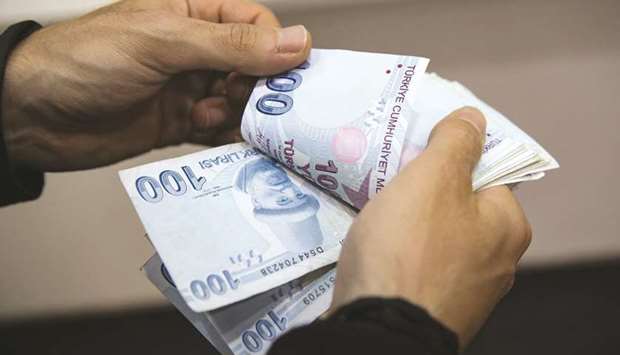After a dismal two years, things are looking up for Turkey’s banks.The nation’s six largest lenders will report their first quarterly profit gains after three straight quarters of declines, according to the median estimate of 15 analysts in a Bloomberg survey. Not only that, earnings per share growth in 2020 will probably outpace peers in emerging markets from Russia to South Africa, the data show.
“Widening net-interest margins, a rebound in credit demand and lower provisions are behind the strong momentum,” Bloomberg Intelligence analyst Tomasz Noetzel said in an e-mail. There are risks and the extent of recovery “will rest on domestic politics and geopolitical tensions, with unpredictable policy making still a major driver of sentiment.”
The turnaround comes after a series of interest-rate cuts that drove the benchmark to below inflation. Turkey’s central bank also pushed other incentives to get credit flowing after a contraction in lending during the early part of 2019, especially with loans in foreign currencies. It’s paying off. Consumer borrowing jumped 10% in the fourth quarter and commercial debt rose 4%, according to data compiled by banking watchdog.
The optimistic outlook is also reflected in banking stocks. The 12-member Borsa Istanbul Banks Sector Index has rallied 14% this year. That compares with a 7.9% gain in Turkey’s benchmark index, the best performing after Nigeria of 94 equity gauges tracked by Bloomberg.
Lira-denominated loan growth is expected to increase more than 15% this year at the country’s three largest private banks, Turkiye Garanti Bankasi AS, Akbank TAS and Turkiye Is Bankasi, the forecasts show. The non-performing loans ratio is also expected to stabilise.
Garanti Bankasi will report earnings on January 30, followed a day later by Akbank. Others to follow include Turkiye Is Bankasi, Yapi ve Kredi Bankasi AS, Turkiye Vakiflar Bankasi TAO and Turkiye Halk Bankasi AS.
“Halkbank, Vakifbank, and Isbank’s results will stand out positively with a substantial quarter-on-quarter earnings increases,” said Cagdas Dogan, a banking analyst at BGC Partners in Istanbul. That will be fuelled by strong net interest margin expansion and relatively lower cost of risk levels, although for Isbank, the profit gains will be mainly due to lower coverage ratios.
“Yapi Kredi will stand out negatively,” he said, because of “a significant NPL clean-up and provisioning boost” although its other key metrics will be in-line with most of its peers.
Still, on an annual basis, net income is set to fall by 3.5% in the fourth quarter from the year-earlier period after lenders increased provisions to cover an increase in non-performing loans and the after-effects of the lira’s decline, the Bloomberg survey showed.
Also, Halkbank was on Tuesday hit with a demand to pay millions of dollars in fine for its continued alleged failure to respond to US sanctions-evasions charges. The US pursuit of the state-owned lender has been a sore point in relations between the two countries. The US and Turkey have also been at odds over the Turkish government’s purchase of a Russian missile-defence system.

A customer counts Turkish one-hundred lira banknotes inside a foreign currency exchange bureau in the Beyoglu district of Istanbul (file). The nation’s six largest lenders will report their first quarterly profit gains after three straight quarters of declines, according to the median estimate of 15 analysts in a Bloomberg survey.


